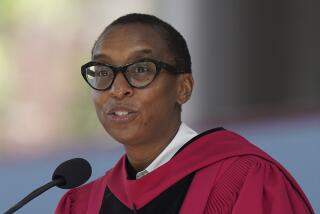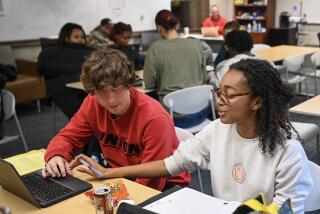Download Your Workload, Offload Your Integrity
- Share via
“Download your workload,” one term paper site advertises. Across the Internet, dozens of sites have sprung up that allow students--usually for a fee ranging from $20 to $100--to download papers and book reports from existing databases. Other sites offer customized services, offering to write book reviews, term papers and even theses for graduate students on specific topics. Still other sites provide financial incentives for students to sell their work online, in effect allowing online auctioning of existing term papers.
These sites represent the tip of a virtual iceberg, an iceberg that is on a collision course with traditional methods of teaching. The Internet is forcing us to rethink our understanding of academic integrity and even to rethink the goals of education itself.
The Internet makes plagiarism easier than ever before, and this poses the most visible threat to academic integrity. Not only are numerous sites selling papers on the Web, but countless more are inadvertently offering them for free.
Professors often post their own work on the Internet, and it is increasingly common for students to do so as well. Coupled with sophisticated search engines, all of this makes a virtual cornucopia of material available to anyone who wants to plagiarize.
There are two responses to this challenge--external and internal. External approaches try to block access to sites, to police student behavior on the Web in various ways. Internal approaches seek to develop the skills and motivation in students so that they will restrain themselves, even when no one is watching, from plagiarizing.
The larger threat to academic integrity, however, lies below the surface. The Internet is transforming how we teach. This is most evident in distance education, where traditional teacher-student interaction is often supplanted by computer-based instruction.
The Internet is quickly transforming what happens--and doesn’t happen--in the traditional classroom, and this presents a much greater challenge.
It is not uncommon for professors, myself included, to put lecture notes on a course Web site. In fact, two years ago UCLA mandated that every undergraduate course have a Web site. Some professors, including many who are less technologically inclined, have barely met the letter of the law, but the overall direction is clear: The Internet increasingly is becoming an integral part of regular courses.
As this happens, many students feel that they hardly need to go to class. Everything they need is available on the course Web site.
Classroom education has always had a dual element. On the one hand, information gets transmitted. On the other hand, there is an engagement that occurs between teacher and students. It is in this process that student academic integrity is formed, not just in some minimalist sense of academic honesty, but also in a much fuller sense of integrity. Students develop an intellectual identity, to see themselves as thinkers who take responsibility for themselves and their ideas. They develop responsibility for their own intellectual quest. This is academic integrity in its most fundamental sense.
As the Internet plays an increasingly prominent role in traditional undergraduate education, two paths are open to us. We can move in a direction that will make classrooms increasingly irrelevant. Insofar as we see education simply as the transmission of information, we will move naturally in this direction.
Or the Internet can be used to free classroom time for more effective interaction among professor, students and the ideas being considered in the course--an interaction that cannot happen on the Web. The momentum of the technology, the apparent economic benefits won by cost-conscious administrators and the lack of appreciation for the central formative process of liberal education all conspire to push us toward the first path. To follow this path to its inevitable destination would be the ultimate violation of academic integrity.






